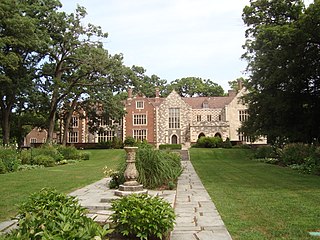Related Research Articles

Des Moines is the capital and most populous city in the U.S. state of Iowa. It is the county seat of Polk County with parts extending into Warren County. It was incorporated on September 22, 1851, as Fort Des Moines, which was shortened to "Des Moines" in 1857. It is located on, and named after, the Des Moines River, which likely was adapted from the early French name, Rivière des Moines, meaning "River of the Monks". The city's population was 214,133 as of the 2020 census. The six-county metropolitan area is ranked 81st in terms of population in the United States, with 709,466 residents according to the 2020 census by the United States Census Bureau, and is the largest metropolitan area fully located within the state.

Hy-Vee, Inc. is an employee-owned chain of supermarkets in the Midwestern and Southern United States, with more than 280 locations in Iowa, Illinois, Kansas, Minnesota, Missouri, Nebraska, South Dakota, Wisconsin, with stores planned in Indiana, Kentucky, Tennessee, and Alabama. Hy-Vee was founded in 1930 by Charles Hyde and David Vredenburg in Beaconsfield, Iowa, in a small brick building known as the Beaconsfield Supply Store, which is listed on the National Register of Historic Places.

Drake University is a private university in Des Moines, Iowa, United States. The University offers over 140 undergraduate and graduate programs, including professional programs in business, education, law, and pharmacy. Drake University Law School was founded in 1865, which makes it one of the 25 oldest law schools in the United States.

The Des Moines Register is the daily morning newspaper of Des Moines, Iowa, United States.

Robert Dolph Ray was an American lawyer and Republican politician. He served as the 38th governor of Iowa from January 16, 1969 to January 14, 1983.

Salisbury House, in Des Moines, Iowa, is a Tudor, Gothic and Carolean style manor home built on a wooded hill with commanding views. It was built by cosmetics magnate Carl Weeks and his wife, Edith Van Slyke Weeks, between 1923 and 1928. Salisbury House was modeled after the King's House in Salisbury, England, contains 42 rooms and measures just over 22,000 square feet (2,000 m2). The property is owned and operated by the Salisbury House Foundation and is open to the public for tours, public events, and private rentals.

Mark Warren Bennett is a former United States district judge of the United States District Court for the Northern District of Iowa and a professor at Drake University Law School.
Des Moines University was an American college in Des Moines, Iowa, that operated from 1865 until 1929. It was established by members of the Baptist Church. It was originally located in an abandoned Lutheran college building at 15th and Pleasant near downtown Des Moines. It moved to College and 9th Avenues in 1884. In 1889, the school was renamed Des Moines College to better reflect its mission.

Proudfoot & Bird was an American architectural firm that designed many buildings throughout the Midwest region of the United States. Originally established in 1882, it remains active through its several successors, and since 2017 has been known as BBS Architects | Engineers.

The Newens Sanitary Dairy Historic District is located in Des Moines, Iowa, United States. It consists of three buildings, the former dairy buildings and the Newens’ family home. The district has been listed on the National Register of Historic Places since 2003.
The following is a timeline of the history of the city of Des Moines, Iowa, US.

The Drake University College of Pharmacy & Health Sciences is located in Des Moines, Iowa. The school, part of Drake University, offers a four-year Doctor of Pharmacy (Pharm.D) degree, and is nationally accredited by the Accreditation Council for Pharmacy Education. As of 2020 Drake's pharmacy school was ranked 46th in the United States.

Chester Cicero Cole was a justice of the Iowa Supreme Court from March 1, 1864 to January 19, 1876 appointed from Polk County, Iowa. He became chief justice in 1869. Cole was a founder of both Iowa law schools.
Gwendolyn Wilson Fowler was an African-American pharmacist, the first black woman licensed in Iowa. She also became the first African-American woman from Iowa to serve in the United States Foreign Service, when she was posted to Vietnam in the 1950s. She was inducted into the Iowa Women's Hall of Fame in 1987.

The 2018 United States House of Representatives elections in Iowa were held on November 6, 2018, to elect the four U.S. representatives from the State of Iowa, one from each of the state's four congressional districts. The elections coincided with the gubernatorial election, as well as other elections to the House of Representatives, elections to the United States Senate, and various state and local elections. The state congressional delegation flipped from a 3–1 Republican majority to a 3–1 Democratic majority.
The 1952 Iowa State Cyclones football team represented Iowa State College of Agricultural and Mechanic Arts in the Big Seven Conference during the 1952 college football season. In their sixth year under head coach Abe Stuber, the Cyclones compiled a 3–6 record, finished in sixth place in the conference, and were outscored by their opponents by a combined total of 199 to 158. They played their home games at Clyde Williams Field in Ames, Iowa.

The F. W. Fitch Company Historic District is a nationally recognized historic district located in Des Moines, Iowa, United States. It was listed on the National Register of Historic Places in 2013. At the time of its nomination the district consisted of five resources, including three contributing buildings, one contributing structure, and one non-contributing building. The industrial buildings were built piecemeal between 1917 and 1944 on the west side of the central business district. The main building (1917) and its addition (1929) are located on the north side of Walnut Street, and the soap plant and the soap plant annex (1944) are located on the south sides of Walnut Street. The contributing structure is a tunnel under Walnut that was built either in 1929 or 1942.

Gardner Cowles Sr. (1861–1946) was an American banker, publisher, and politician. He was the owner of The Des Moines Register and the Des Moines Tribune.
The 1951 Drake Bulldogs football team was an American football team that represented Drake University as a member of the Missouri Valley Conference during the 1951 college football season. In its third season under head coach Warren Gaer, the team compiled a 7–2 record, tied for fourth place in the conference, and outscored opponents by a total of 247 to 117. The team was ranked at No. 80 in the 1951 Litkenhous Ratings.
References
- 1 2 3 4 5 6 7 Peterson, William John (1952). The Story of Iowa: The Progress of an American State, Volume 3, New York: Lewis Historical Publishing Co., Inc. p. 59
- ↑ Dougherty, Harriet. "History of Plainville City and Township", Plainville Times, September 21, 1961, p. 12.
- 1 2 3 "The Biographical Dictionary of Iowa". The University of Iowa. Retrieved November 16, 2017.
- 1 2 3 "Weeks & Leo - History". Weeks & Leo. Retrieved November 18, 2017.
- 1 2 "Armand". cosmetics and skin. Retrieved December 4, 2017.
- ↑ Galloway, J. Earle; Granberg, C. Boyd. "HISTORY OF THE DRAKE UNIVERSITY COLLEGE OF PHARMACY" (PDF). Drake University. Retrieved November 30, 2017.